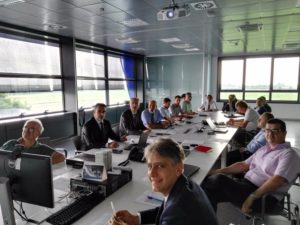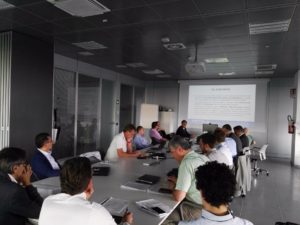Workshop “Additive Technologies: new skills and new jobs”
13 July 2016 | Cameri, Italy
On 13 July, a METALS’ project workshop was organised by UCIMU – SISTEMI PER PRODURRE, a CECIMO member, with members of AITA (the Association of the Italian Additive Manufacturing Sector). The event took place at the premises of Italy-based AVIO AERO, a business run by GE Aviation focusing on design and production of hi-tech components for the aerospace, energy and racing sectors.
Over 20 experts on additive manufacturing processes from academia, firms in the value chain of the machine tool industry and business associations discussed METALS’ activities so far, and provided inputs on the path ahead for the project. 
METALS’s findings on the most relevant emerging technologies for the machine tool sector in the next decade offered the starting point for the debate, which then moved to the identification of which production stages and related skills will be affected the most by additive manufacturing.
Participants agreed over the evolution of skills in two phases in particular: design and planning, and maintenance. Design and planning was considered to capture the essence of developments in additive manufacturing, characterized by two professional profiles in the future: specialized designer and technologist. The first will be in charge of activities such as identifying the best materials and employing topological and conventional CAD software to design parts, the second will deal with setting the process’ parameters and deciding over the position of the piece to be created. The two profiles will be interconnected, with a sufficient knowledge of each other specialization.
Maintenance was identified as another key production stage subject to major changes. where the need for high safety standards will require very specific knowledge of additive manufacturing. The figure of a future “specialized maintenance technician” clearly emerged in the workshop.
According to the participants, the rise of additive manufacturing in other production stages is set to pose fewer changes to the skillset of workers in the machine tool field. For stages with an already low level of human intervention, competences in operation were not expected to be much affected, if excluded the strict safety standards that will be needed.
The post-processing as well as test and controls stages, although based on a higher machine-human interaction, were considered to require only small changes to the traditional competences of workers on the shop floor.
That participants demonstrated great interest on the subjects tackled during the METALS workshop. They intend to meet again in the near future to discuss further on skills and additive manufacturing in the machine tool industry.


